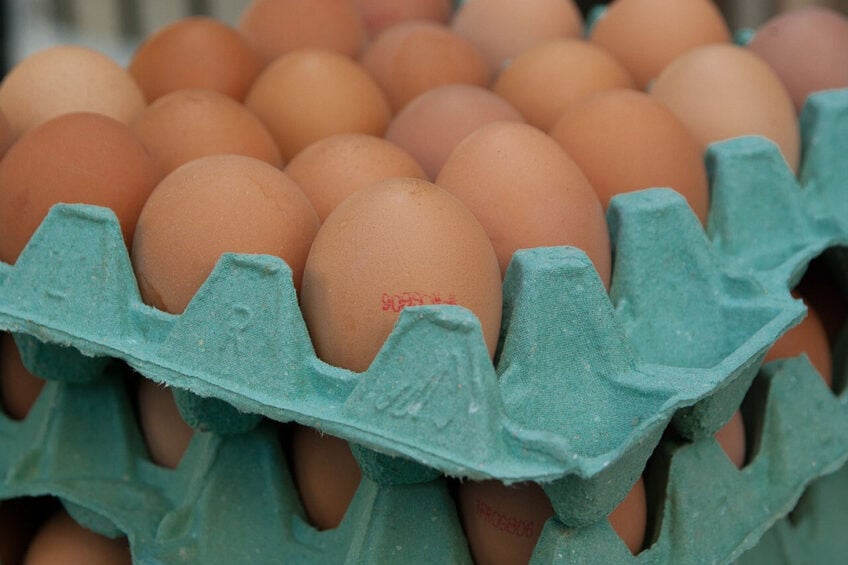November 27, 2025 | 21:29 GMT +7
November 27, 2025 | 21:29 GMT +7
Hotline: 0913.378.918
November 27, 2025 | 21:29 GMT +7
Hotline: 0913.378.918
According to them, it is all going too fast and will jeopardise the livelihoods of farmers.

At present, cage eggs still account for 50% of Australia's production. Photo: Jackmac34
Australian supermarket chains Coles and Woolworths announced 10 years ago that by 2025 they would stop selling cage eggs. Since then, the retailers have been gradually phasing out the sale of these eggs in collaboration with the producers involved. Other retailers and the hospitality industry also want to stop sourcing cage eggs.
At present, cage eggs still account for 50% of Australia’s production. But there is a lot of pressure from animal rights groups. Consumers also show increasing interest in improving animal welfare. An independent poultry welfare study found that it would be desirable to end the sale of cage eggs in the country by 2036.
The governments of the various states may require this, but poultry farmers are very concerned. Egg Farmers of Australia wants to delay the phasing out of cage eggs until 2046. “This will have a major impact on the livelihoods of today’s farmers who produce cage eggs. They will certainly demand compensation from the government in their state if the relevant minister of agriculture approves the recommendations of the study,” said the organisation’s CEO, Melinda Hashimoto.
Opposition from the poultry sector would not benefit the Woolworths and Coles supermarkets. There have been regular shortages of eggs in the last year and a half, and the price of free-range eggs has reached €5.5 per dozen for some brands. Egg price increases are related to the fact that the cost of feed has risen sharply. In addition, there were outbreaks of diseases in other countries, which increased imports and flooding of the domestic market.
The demand for cage eggs in Australia also remains high. Commercial Egg Farmers of South Australia and Tasmania spokesperson, Darren Latten, said that many consumers are looking for the lowest price available because they have less to spend. “And cage eggs are often the cheapest choice because they cost less to produce.”
Latten underlines that the price of wheat rose from €245 to €460 over the past 2 years. “We are on a rollercoaster,” he said. “Poultry farmers are not ready to phase out cage eggs. Such a step will lead to even greater shortages on supermarket shelves.”
Colin Ford, the owner of Albany Farm Fresh Eggs, a company that produces free-range eggs, says that a mandatory phase-out of cage eggs will result in many poultry farmers closing their businesses. “They are exclusively focused on intensive poultry production. The production of free-range eggs is completely uncharted territory for them.”
Chairman Bede Burke of Egg Farmers of Australia believes that poultry farmers should be given more time to phase out cage egg production for all these reasons. “The way things are going now, it is far too early to ban cage eggs,” he says. “This will ruin a lot of family businesses.”
(PW)

(VAN) A new study reveals how the simultaneous effects of ocean acidification, salinity and loss of oxygen are making the world more fragile.

(VAN) Hopes are growing that the creation of the first 3D turkey gut model could be a turning point in the battle against the virulent blackhead disease.

(VAN) Tyson, America’s biggest meat supplier, plans to shutter one of its largest beef processing plants as the industry continues to struggle with low cattle supplies and political pressure from Washington.

(VAN) New FAO study shows how digital solutions are empowering farmers and fishers to prevent losses and build resilient agrifood systems.

(VAN) Brazil's COP30 presidency pushed through a compromise climate deal on Saturday that would boost finance for poor nations coping with global warming but that omitted any mention of the fossil fuels driving it.

(VAN) Poultry farmers in the UK have been warned that they could face one of the worst winters yet for bird flu.

(VAN) Prices of main-crop paddy have risen sharply, with jasmine rice hitting 16,100 baht per tonne — the highest level in years.